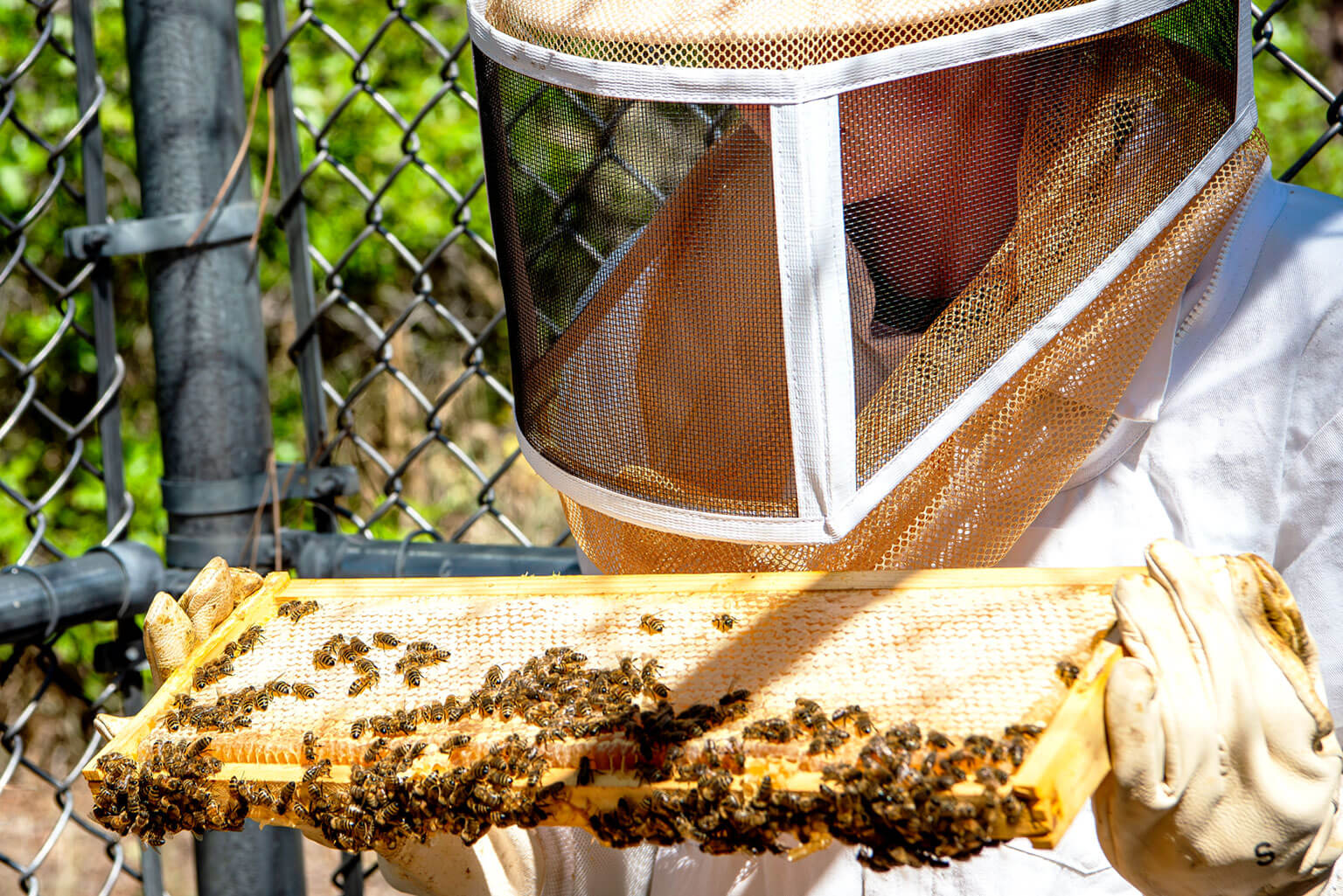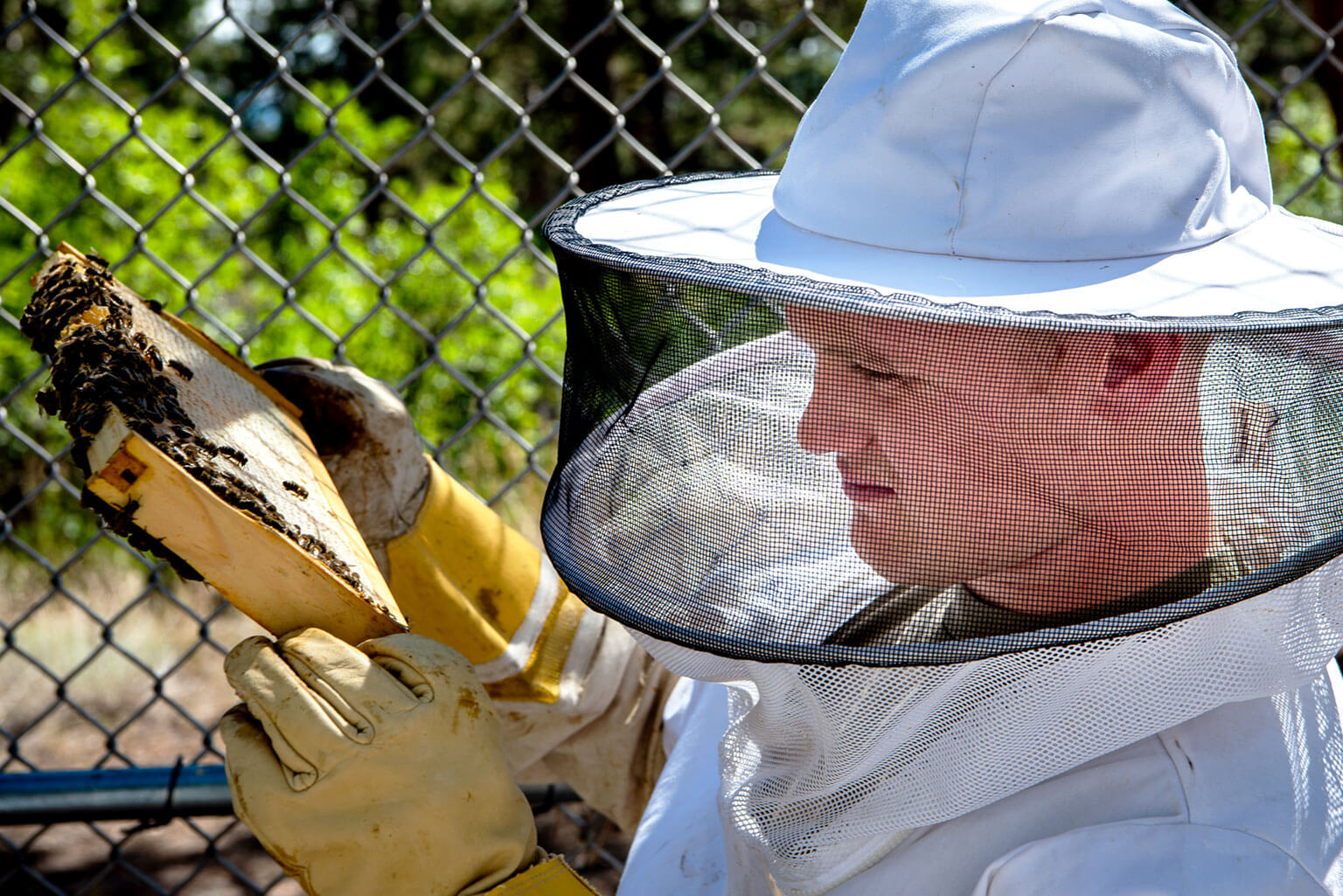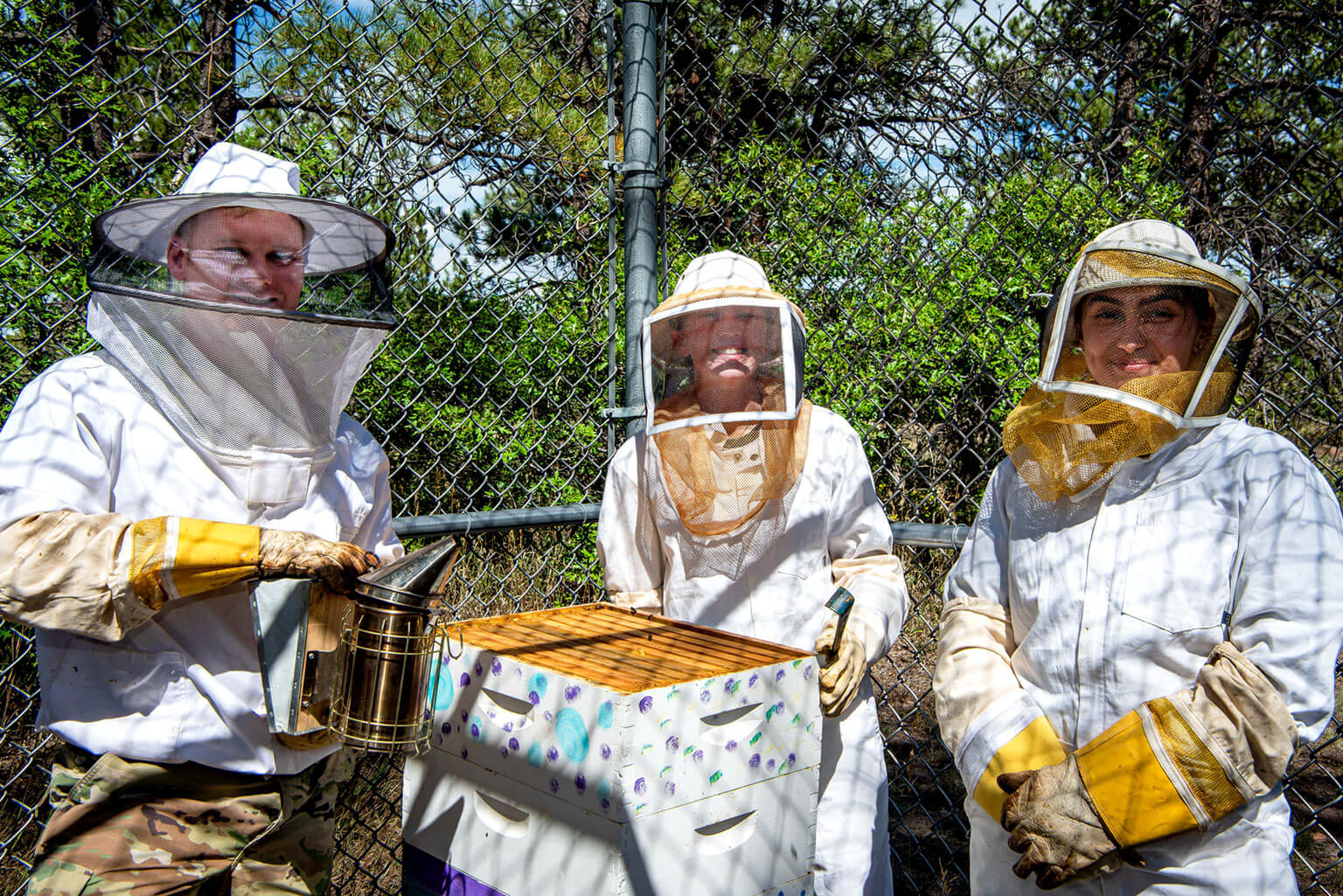Academy hive has cadets looking out for them

Cadet 1st Class Sophia Leonard smiles as she examines bees from the U.S. Air Force Academy Beekeeping Club hive Aug. 28, 2024. Through the club’s interactive learning experiences, about 60 members gain and share a deep understanding of bee behavior, hive dynamics and responsible beekeeping practices. (U.S. Air Force photo by Justin Pacheco)
By Randy Roughton
U.S. Air Force Academy Strategic Communications
U.S. AIR FORCE ACADEMY, Colo. – Each season offers a new priority for the U.S. Air Force Academy Beekeeping Club in their care of a hive of 60,000 Italian honeybees in the natural resources office by Falcon Stadium. Soon, they will harvest the hive’s honey. When the weather begins to turn colder, the priority becomes disease control.
The work is all worth it in the spring when the cadets see the hive come back to life.
“When we take care of the bees, it’s a perfect example of cadets developing into leaders of character,” said Cadet 1st Class Almendra Vega, a Biology major and the club’s cadet in charge. “Beekeeping Club members care for the bees right here at the Academy where we live. We are giving back to the environment, helping flowers bloom and contributing to the health of our bees.”
Learning about bees through experiential activities
Through the club’s interactive learning experiences, about 60 members gain and share a deep understanding of bee behavior, hive dynamics and responsible beekeeping practices. Cadets meet regularly to educate each other about beekeeping and test their skills at caring for the bees. Throughout the academic year, the club also organizes social events to raise awareness of the importance of our pollinators in Colorado and foster a sense of community for bee enthusiasts.
Vega joined the club during her sophomore year two years ago because she wanted to learn a new skill and help the club grow. She quickly learned about the importance of bees to the environment. That made her want to learn how to take care of them and support community pollination.

Cadet 1st Class Remington Stiles displays a frame of honey from the U.S. Air Force Academy Beekeeping Club hive near the natural resources’ office. Through the club’s interactive learning experiences, about 60 members gain and share a deep understanding of bee behavior, hive dynamics and responsible beekeeping practices. (U.S. Air Force photo by Justin Pacheco)
The hive operations chief
Cadet 1st Class Remington Stiles’ fellow Beekeeping Club members call him “the hive operations chief” as the leader of a team of club bee experts. He first became involved in beekeeping with a local beekeeping association during high school in Kansas and quickly joined the efforts to create the club during his first year as a cadet. Apart from the opportunity to experience a part of nature and participate in a mindful activity, Stiles appreciates the responsibility club duties present.
“The club teaches accountability at the end of the day,” Stiles said. “We don’t have any disciplinary actions if you don’t perform your beekeeping duties or rewards if you do. But the bees require your help for their survival. That is the ultimate accountability.”
After harvesting honey in the fall, the club changes its focus to disease prevention and supplement the bees’ food. The main threat is Varroa mites, parasites that can destroy an entire bee colony. The cadets also physically inspect for other parasites and diseases to help the hive survive through the winter.
Returning to the hive in the spring
When the temperatures consistently climb in the 50s in the spring, the club members return to the hive. They don’t know exactly what they will find but hope their efforts to protect the hive allowed the colony to survive the winter. Stiles recalls approaching the hive in his cloth hazard materials suit, listening and looking into the hive for signs of life. He hoped to soon hear the familiar buzzing sound, but first, he wanted to see bee movement.
“You are staring at that hive entrance, waiting to see if anything emerges,” Stiles said. “You check the temperature every day to determine if it’s warm enough for them. Then, you approach the hive, hoping to see any movement and not see any signs of disease. Once you take the top of the hive off, you should see a little bit of movement and hear them buzzing. That’s when you know things are probably going to be OK.”
Helping the club grow
The club’s leadership hopes they have turned the corner with a strong nucleus of members who stay throughout the school year. They want their fellow cadets to know that not every member joins because of a strong interest in bees. For many new members, it begins with a desire to help the environment by protecting the bees.
“I think it’s important for everyone to know that we are a new club, but we are growing,” Vega said. “We figure out ways to keep our bees alive and healthy. We spread information about them and their importance.”

Cadet 1st Class Remington Stiles, Sophia Leonard, middle, and Almendra Vega pose in their hazard materials suits near the U.S. Air Force Academy Beekeeping Club hive at the natural resources office Aug. 28, 2024. Through the club’s interactive learning experiences, about 60 members gain and share a deep understanding of bee behavior, hive dynamics and responsible beekeeping practices. (U.S. Air Force photo by Justin Pacheco)
See more Beekeeping Club photos at Flickr.